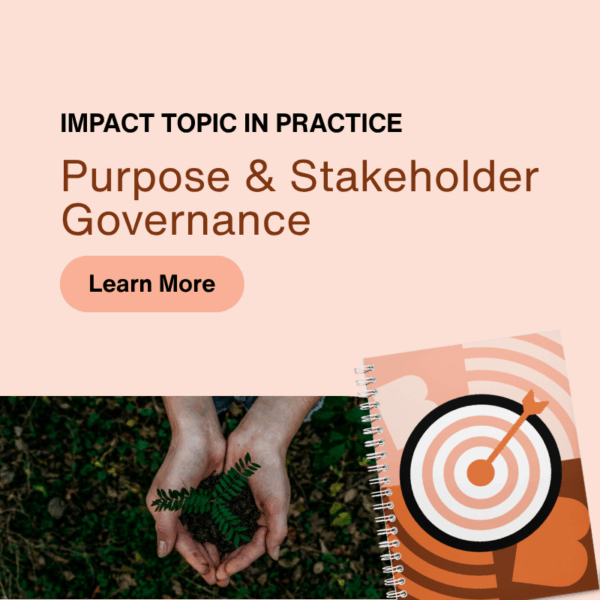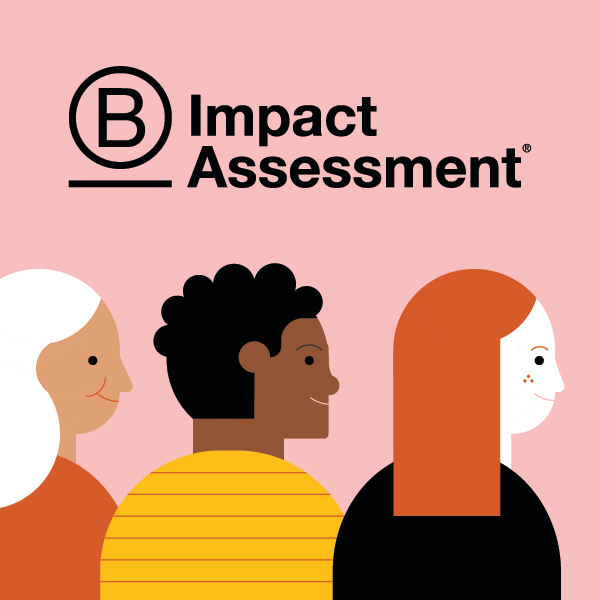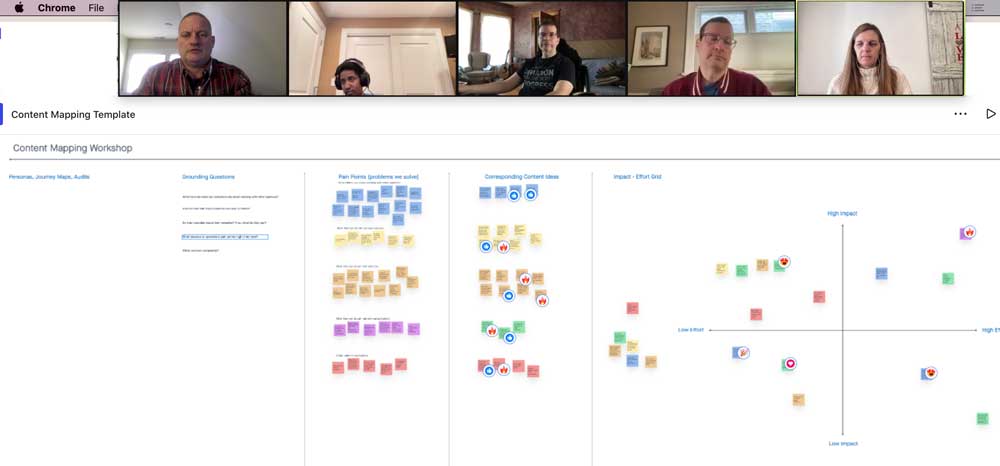Client, Partner, and Supplier Screening Tools for Positive Impact Supply Chains
May 11, 2022
B Corps Share Lessons from Screening Suppliers and Clients to Amplify Positive Impact
Across industries and companies of varying sizes, more businesses are recognizing the need and opportunity to manage their partnerships, purchases, and supply chain to amplify their social and environmental impact. One key way to do this is by screening suppliers and clients for positive and negative impact, which creates a ripple effect that amplifies one company’s impact through its entire supply chain and network. By taking steps to support purpose-driven and transformative companies, Certified B Corporations can shape a better economy for people and the planet — and gauge their impact through the standards in the B Impact Assessment.
As a tool for measurement and improvement, the B Impact Assessment includes resources that businesses can use to enhance and guide their policies, products, and services. These include a Best Practice Guide specific to partnership impact and supplier screening, Creating Impact through Purchasing: Managing the Impact and Inclusion of Your Supply Chain, created by B Lab to help companies leverage their everyday practices to make a positive impact.
Related: These 11 B Corps can help amplify your company’s story.
A recent post on the B Hive, an online community for people who work at B Corps, offers examples of the ways that business leaders are collaborating while seeking to build their companies’ positive impact and bottom line. By screening suppliers, clients, and other business partners for their impact, B Corps of any size can develop an impact supply chain for broader social and environmental good.
The post, from Brad Flowers of Bullhorn Creative, asked for examples of an effective policy that defines the types of clients that other B Corps — in this case, marketing agencies — will work with. While Bullhorn had an informal policy of doing “good work for good people” since its start, the need to create a more rigorous supplier screening policy recently emerged. “There was an instance where a client’s mission was in line with ours, but how they did it went against an individual employee’s values,” Flowers said. “We opened it up to a group discussion at our quarterly retreat. In the end, we decided it was too difficult to draw a hard line for who we would not work with. Instead, we decided to focus on who we want to work with. And, because we value our individual team members, we are developing a recusal process in the case that someone feels strongly about a particular client.”
B The Change reached out to others who responded to Flowers in the B Hive conversation to further share their lessons and suggestions for companies looking to build purpose into their business partnerships. They include Mona Eskayo of Bridge City Media, Alysha Schultz of Intuitive Digital, Tim Frick of Mightybytes, and Vineeta Greenwood of Wholegrain Digital.
As highlighted in their responses below, several common themes emerge: incorporating employees in shaping policies, evolving policies over time, saying no to clients who aren’t the right fit, and finding others through referrals. As Eskayo of Bridge City Media said, “Our mindset has been that every project we turn down creates an opportunity for us to work with clients who really believe in what we’re doing and want to invest in our company and team — and so far it’s worked.”

Impact Topic in Practice
The Purpose & Stakeholder Governance Impact Topic supports B Lab’s goals to overturn shareholder primacy, put sustainability at the right level within the company, and fight greenwashing. This guide helps companies put the standards into practice.
How has your company created and updated guidelines/policy for screening clients and other partners?
Eskayo at Bridge City: We created our policy for who we work with (and who we don’t) in mid-2021, around the time when we became B Corp Certified and hit our five-year anniversary as a company. Because we’re a pretty small team, we collected input from all staff and regular contractors, and then a group of three of us sat down to draft what’s become our External Policy on Clients and Projects.
Schultz at Intuitive: In 2017, our marketing and sales teams created a Lead Scoring process for sales to evaluate the quality of inbound leads. The various areas evaluated were determined by looking at learnings from our account management and technical teams on our most and least successful client partnerships — items like partner follow-through on communication and timelines, if their company’s values lined up with our own, and whether we are likely to help them reach their goals. After becoming a B Corp in early 2020, we added a secondary brand assessment to this process. We look into the company’s labor practices, customer service, employee satisfaction, product sourcing, and sustainability practices, as well as their record on diversity, inclusion, and anti-racism.
Frick at Mightybytes: When Mightybytes became a B Corp in 2011, we put policies in place for who we would and wouldn’t work with. I research every organization that reaches out to us. I’ll also involve the team in these decisions, often before the first business development conversation even happens. We also encourage others to steal or adapt our Code of Ethics. Though it doesn’t explicitly state who we will and won’t work with, it does make our ethical guidelines very clear.
Greenwood at Wholegrain: We had guidelines right from the beginning but we created the official ethical screening process in 2009.

Bridge City Media colleagues Mona Eskayo and Anchitta Noowong discuss client work in the B Corp’s Portland, Oregon, office. (Photo courtesy Bridge City Media)
How do you intentionally pursue work with B Corps or other purpose-driven clients?
Flowers at Bullhorn: Right now, we only pursue B Corps or other purpose-driven clients in our marketing because we want our work to broaden and continue making a positive impact. B Corp Certification is the best filter to help us know a company is doing what they say.
Schultz at Intuitive: We’re always looking to work with organizations whose purpose and values mirror or complement our own. There are times we’ve been fortunate enough to help current partners improve their own services by being more inclusive. For example, a detox treatment provider we work with had traditionally gendered intake forms and website language. After ensuring they had the appropriate internal process and systems to support nonbinary individuals in their programs, we pushed them to make their website and intake forms have more inclusive language.

Explore the B Impact Assessment
Use the free B Impact Assessment to evaluate your company’s impact on all stakeholders, including the environment, your workers, your community, and your customers.
Has the policy meant turning down projects? Has it helped attract new clients?
Eskayo at Bridge City: We’ve definitely turned away potential clients because they wouldn’t be values-aligned no matter how we could try to shape a project. As a small company, it can be a tough call to make, because we’re also always balancing the need to be able to support our staff and create a better workplace.
Frick at Mightybytes: We have definitely turned down misaligned projects. When we first certified as a B Corp, not enough people understood what that meant to use it as a driver for doing business. However, as awareness and the B Corp movement have grown, the Certification has played an increasing role in clients’ decisions to work with us.
Greenwood at Wholegrain: We regularly turn down potential clients. This is a once-a-month occurrence. Here is a long form article that our CEO Tom Greenwood wrote for Louder than 10 on how we say no to bad money and what it has resulted in. We attract clients that believe we do what we say we do and stand for it. This helps with attracting mission-aligned clients who care about improving human rights and mitigating climate change. We’ve had fantastic clients like One Ocean hub come to us off the back of the work we did for LSE’s Gender hub.

Team members at Mightybytes conduct an online website content mapping workshop. (Photo courtesy Mightybytes)
What suggestions would you offer for companies creating client and supplier screening policies of their own?
Eskayo at Bridge City: Be honest about where you’re at — with your team and as a company. The most important thing to us is listening to our team to make sure everyone is excited about the work we’re doing. Another thing we take pretty seriously is budgets — taking a close look at where the money comes from and where it goes is another way we can check ourselves and continue to push our work toward our values.
Flowers at Bullhorn: Spend most of your time defining who you would love to work with. Create messaging to attract the business you want, and it will be a turnoff for the companies you don’t want to work for. Also, think about the project and not the client. For example, we have two sober folks in our office. They feel strongly about not working for spirits companies. However, Brown-Forman (the company that owns Jack Daniels and others) reached out to us to help them create an internal alcohol-responsibility campaign. Because of our perspective, we were able to create a successful campaign to empower their employees.
Greenwood at Wholegrain: Create policies where they are necessary — creating a policy doesn’t change the culture. Involve your team, and they will lead the way on the final say. Our vegetarian policy came about as a team decision. To empower people, we enroll people on a decision, not enforce decisions.
Find B Corps that offer services and products for other businesses:
- 11 B2B Marketing B Corps: Amplify Your Company’s Story With These Creative B Corps
- 17 B Corp Vendors and Suppliers That Can Help Amplify Your Company’s Positive Impact
- B Corps Doing Business Better: Screening Supply Chains for Positive Impact
- 6 B2B Sustainability B Corps: Start Lowering Your Company’s Carbon Footprint with These B Corps
-

Business Strategy
2 Complementary Tools Help Companies Measure and Report Their Impact on Stakeholders
Read More -

Business Strategy
A Report on Stakeholder Capitalism: Global Momentum in the Drive for Systemic Economic Change
Read More -

Business Strategy
5 Lessons on Business Resilience and Stakeholder Engagement From the Great Recession
Read More -

B Corp Month
B Corps Doing Business Better: Enhancing Workplace Wellness by Offering Health Insurance to Part-Time Employees
Read More
Sign Up for our B The Change Newsletter
Read stories on the B Corp Movement and people using business as a force for good. The B The Change Newsletter is sent weekly.
